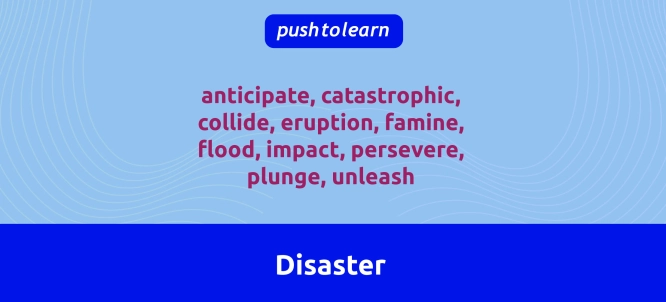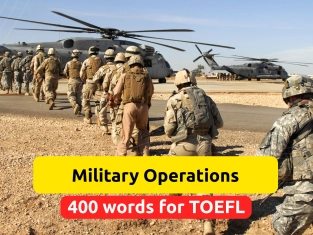by PushtoLearn
Disaster
Table of Contents
Disaster Flashcards - Vocabulary Practice for TOEFL
These exercises focus on Disaster Vocabulary
Vocabulary List for Disasters
1. Anticipate
-
Definition: To expect or predict that something will happen and prepare for it.
-
Example: "Scientists anticipate that there will be more hurricanes this year due to climate change."
-
Explanation: Anticipating disasters can help communities prepare for potential damage and reduce the impact.
2. Catastrophic
-
Definition: Involving sudden and widespread disaster or damage.
-
Example: "The earthquake had catastrophic effects, destroying entire neighborhoods."
-
Explanation: Catastrophic events cause large-scale destruction, affecting people, buildings, and the environment.
3. Collide
-
Definition: To crash into something with force.
-
Example: "The two cars collided in the storm, causing a major accident."
-
Explanation: When objects collide during a disaster, like cars or even tectonic plates, the result can be very damaging.
4. Eruption
-
Definition: A sudden explosion or release of material, usually from a volcano.
-
Example: "The volcanic eruption covered the nearby towns with ash and lava."
-
Explanation: Eruptions are dangerous because they release hot lava, ash, and gases that can destroy everything in their path.
5. Famine
-
Definition: A severe shortage of food, leading to widespread hunger.
-
Example: "After years of drought, the region faced a terrible famine."
-
Explanation: Famine often occurs as a result of disasters like droughts, which make it difficult for people to grow or access food.
6. Flood
-
Definition: A large amount of water covering an area that is usually dry.
-
Example: "Heavy rainfall caused a flood that destroyed homes and roads."
-
Explanation: Floods happen when rivers overflow, sea levels rise, or there is extreme rainfall, causing water to cover land and create dangerous conditions.
7. Impact
-
Definition: The strong effect or influence of one thing on another.
-
Example: "The impact of the storm was felt across the entire region."
-
Explanation: Disasters have a significant impact on people’s lives, the economy, and the environment, often leading to long-term consequences.
8. Persevere
-
Definition: To continue trying to do something despite difficulties.
-
Example: "Rescue teams had to persevere through dangerous conditions to help the survivors."
-
Explanation: Perseverance is essential during and after disasters, as people must keep going even when the situation is challenging.
9. Plunge
-
Definition: To fall or move suddenly and quickly downwards.
-
Example: "Temperatures plunged during the blizzard, making it even more dangerous."
-
Explanation: Plunge is often used to describe sudden drops in temperature, stock markets, or water levels, which can create disaster conditions.
10. Unleash
-
Definition: To release or set free, especially something powerful or destructive.
-
Example: "The storm unleashed powerful winds that caused massive damage."
-
Explanation: Disasters can unleash forces like strong winds, earthquakes, or volcanic eruptions, leading to widespread destruction.
Summary Table
|
Word |
Definition |
Example |
|
Anticipate |
To expect or predict |
"Scientists anticipate more earthquakes this year." |
|
Catastrophic |
Involving widespread disaster or damage |
"The wildfire had catastrophic effects." |
|
Collide |
To crash into something |
"The cars collided on the icy road." |
|
Eruption |
A sudden explosion, especially from a volcano |
"The volcano’s eruption spread ash for miles." |
|
Famine |
A severe shortage of food |
"The drought led to a terrible famine." |
|
Flood |
A large amount of water covering dry land |
"The flood destroyed many homes in the area." |
|
Impact |
The strong effect of something |
"The impact of the hurricane was devastating." |
|
Persevere |
To continue despite difficulties |
"The rescue team persevered through the storm." |
|
Plunge |
To fall or drop suddenly |
"Temperatures plunged during the cold snap." |
|
Unleash |
To release something powerful |
"The storm unleashed strong winds." |
Examples in Context
-
Anticipate: "Meteorologists anticipate that the hurricane season will be particularly intense this year."
-
Catastrophic: "The tornado had catastrophic effects on the small town, leaving many homes destroyed."
-
Collide: "The two ships collided during the storm, causing a massive oil spill."
-
Eruption: "The sudden eruption of the volcano forced people to evacuate the nearby villages."
-
Famine: "After months without rain, the area was at risk of famine due to failing crops."
-
Flood: "The river overflowed, leading to a flood that displaced thousands of people."
-
Impact: "The impact of the earthquake was felt hundreds of miles away."
-
Persevere: "Despite harsh conditions, the team persevered and completed the rescue mission."
-
Plunge: "The temperature plunged overnight, making the roads icy and dangerous."
-
Unleash: "The storm unleashed heavy rains and winds that caused widespread destruction."

FAQ About the Disaster Vocabulary Module
How can I remember these disaster-related vocabulary words?
Use flashcards and mnemonics to connect each word to its meaning. For example, think of “catastrophic” as related to “catastrophe” (a disaster). Visualize each word, like picturing a volcano for “eruption.”
What’s the difference between “anticipate” and “predict”?
Both mean expecting something to happen. Anticipate often suggests preparing for it, while predict is simply saying that it will likely happen.
Can “plunge” describe things other than temperature?
Yes! Plunge can describe any sudden drop, such as in stock prices, water levels, or even emotions (e.g., "His confidence plunged after the failure").
When should I use “impact” vs. “effect”?
Impact often refers to the initial, strong effect of an event (e.g., "The impact of the earthquake"). Effect is broader and can refer to any change caused by an event (e.g., "The effects of climate change").
What’s an easy way to understand “catastrophic”?
Think of catastrophic as meaning “really, really bad.” A catastrophic event causes large-scale damage or destruction, like a tsunami or a huge fire.

